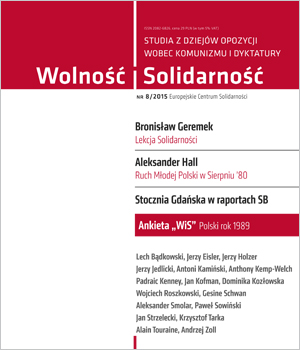Nie tylko Helsinki. Solidarność i zapoznana kultura praw człowieka
Beyond the “helsinki effect”: solidarity, Movement and the contested culture of Human Rights
Author(s): Robert BrierSubject(s): History, Recent History (1900 till today), Special Historiographies:
Published by: Wydawnictwo Uniwersytetu Jagiellońskiego
Summary/Abstract: After Solidarity’s oppression in December 1981, a far-flung transnational network of support committees emerged, providing material aid and raising international awareness for Solidarity’s fate. In the existing literature, this kind of human rights advocacy is usually seen in association with the Helsinki Final Act of 1975. According to this interpretation, the West managed put its human rights values unto the agenda of East-West détente at Helsinki, thus spurring opposition movements in the Soviet bloc. This article puts forth a different interpretation. Though the Final Act was doubtlessly important, Solidarity still needed western supporters who would bring its situation before the Conference on Security and Cooperation and other international forums. Why did they help? And why did others not help? Usually, Western human rights advocacy is seen as an offshoot of the Cold War. Surprisingly, however, Solidarity’s diverse group of supporters did not entail only western “Cold Warriors,” but also French leftist intellectuals and even peace activists. To understand the motivations of Solidarity’s diverse supporters, the article argues, we have to understand two points: First, in the early 1980s, human rights activism was still a comparatively novel form of organizing political protest; second, Solidarity was a movement which eschewed western political categories and undercut taken-for-granted assumptions about the Cold War. For a variety of western actors, supporting Solidarity was a way of formulating a human rights policy in line with their own political views. Solidarity thus emerges as a contested icon – a powerful symbol which the movement’s supporters tried to claim for their own interpretation of human rights.
Journal: Wolność i Solidarność
- Issue Year: 2015
- Issue No: 8
- Page Range: 63-75
- Page Count: 13
- Language: Polish

